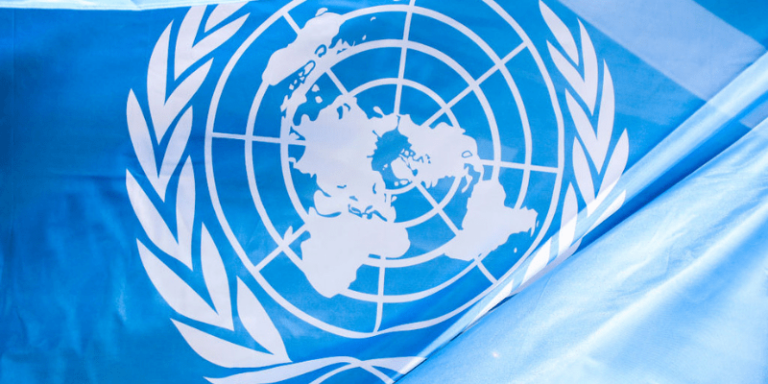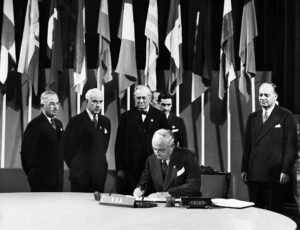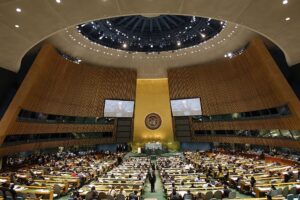Understanding the United Nations
The UN was built for world peace, but can it deliver?
By: Andrew Moran | February 10, 2021 | 735 Words

United Nations flag (Photo by Beata Zawrzel/NurPhoto via Getty Images)
The beginnings of the United Nations came in January 1942, when representatives of 26 nations at war with Germany, Italy, and Japan – also called the Axis – convened in Washington, D.C. Officials signed the Declaration of the United Nations endorsing the Atlantic Charter. This was a pledge to maximize their resources against the Axis powers. A year later, the Quebec Conference was held, where leaders drafted a declaration that demanded “a general international organization, based on the principle sovereign equality of all nations.” They also created various task-oriented extensions, like the Food and Agricultural Organization (FAO), the International Monetary Fund (IMF), and the World Bank.
In June 1945, the United Nations was officially established as an intergovernmental organization in the aftermath of the Second World War. Leaders worldwide wanted to do something to avoid the consequences of global conflict and maintain the peace that had been secured after the war. Three nations had taken the lead to get the UN started: the U.S., the United Kingdom, and Russia.

United States representative signing the United Nations Charter. (Getty Images)
Representatives from 50 nations met in San Francisco to draw up the United Nations Charter that went into effect in October 1945. The Charter begins:
“We the peoples of the United Nations determined to save succeeding generations from the scourge of war, which twice in our lifetime has brought untold sorrow to mankind; and to reaffirm faith in fundamental human rights, in the dignity and worth of the human person, in the equal rights of men and women and of nations large and small; and to establish conditions under which justice and respect for the obligations arising from treaties and other sources of international law can be maintained; and to promote social progress and better standards of life in larger freedom.”
Today, the UN is headquartered in New York City with 193 members and two observer states. It maintains an International Court of Justice, as well as dozens of specialized agencies, funds, and programs. In addition to the IMF and the World Bank, the UN also runs the International Bank for Reconstruction and Development (IBRD), the World Health Organization (WHO), and the International Labor Organization (ILO).
In 2020, the UN ran a $3.1 billion budget, with the U.S. contributing more than a fifth. If the UN requires more resources, member nations will offer donations, including peacekeeping forces.
It is determined to develop friendly relations between countries, promoting the principles of equal rights and self-determination. It tries to keep peace and unilateral respect by offering food and medical assistance during emergencies, promoting higher living standards, providing humanitarian support across the globe, and acting as the central body to resolve international economic, social, cultural, and humanitarian problems.
The UN’s official languages are English, French, Chinese, Spanish, Arabic, and Russian. It has four primary leaders: Secretary-General António Guterres, Deputy Secretary-General Amina J. Mohammed, General Assembly President Volkan Bozkır, and Economic and Social Council President Munir Akram. The head of the powerful Security Council is the United Kingdom.
Scandals at the UN

(Photo by Michael Nagle/Getty Images)
The UN had been flooded with accusations of corruption and fraud for its recently abolished Oil-for-Food program. The idea was to let Iraq to trade crude oil for basic needs to survive sanctions imposed on the country. An independent inquiry, led by former Federal Reserve Chair Paul Volcker, had uncovered billions of dollars in kickbacks that involved many UN officials, including Kojo Anna, the son of then-Secretary General Kofi Annan.
Many media outlets and non-governmental organizations (NGOs) have published reports and accounts detailing abuse that has produced thousands of victims with no arrests. Guterres announced new measures to combat abuse and exploitation. But a lot of people believe it’s all talk and no action because the UN had commissioned a report a decade earlier without accomplishing much.
Does the UN Have a Future?
The United Nations has become a joke to many people because of its weak leadership and lack of action. But while its poor management may be comical, it has also led to tragic affairs that have ruined the lives of impoverished people. Does the UN have a future? As long as countries continue to believe that reforms are on the way, and the UN sells the next global crisis that requires the the organization, it will always be around.
















